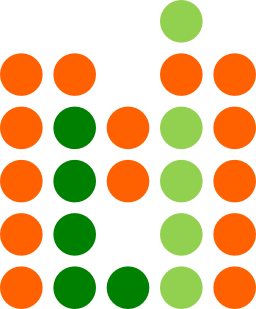 @ 2011-10-18 12:31 PM (#5824 - in reply to #5749) (#5824) Top
@ 2011-10-18 12:31 PM (#5824 - in reply to #5749) (#5824) Top
Posts: 1869








Country : India
debmohanty posted @ 2011-10-18 12:31 PM
My idea of instant grading only at the end is roughly borrowed from offline events where you are always advised to spend last few minutes checking the already solved puzzles, rather than starting new puzzles. So it is basically a review period, as Thomas put it.
However, I understand Palmer's view - it adds bit of complexity. Instant grading in this test was seamlessly integrated with the overall setup. Doing it at the end adds one more overhead on the players.
We probably can try it once to see how it works.
However, I understand Palmer's view - it adds bit of complexity. Instant grading in this test was seamlessly integrated with the overall setup. Doing it at the end adds one more overhead on the players.
We probably can try it once to see how it works.
 @ 2011-10-20 3:01 AM (#5825 - in reply to #5749) (#5825) Top
@ 2011-10-20 3:01 AM (#5825 - in reply to #5749) (#5825) TopPosts: 20

Country : United States
spelvin posted @ 2011-10-20 3:01 AM
My reaction to Instant Grading: It made the test more fun. In the sense that, any time I do an online puzzle competition (especially the USPC), I worry about whether I have typos. Should I double-check this string as I'm typing it in? If I already double-checked it, should I check again at the end? I don't really feel comfortable about anything I submit until it's officially confirmed, which usually happens later. With this competition, once I saw a green number I didn't have to worry about that puzzle ever again, which made the whole experience much less nerve-wracking and more enjoyable.
I also didn't have any incorrect submissions, so I didn't have the experience of making a solving error and being granted the chance to correct it. I can see why some top solvers think that breaks the purity of the experience, but I have to ask, should competitors' scores be more defined by what we solve or what mistakes we make? In the same sense, as a math teacher, when I construct exams, I am often torn about whether to write "trap" questions that deal with exceptional situations where rules work differently, or more straightforward questions. In one sense, the traps are important because I need to assess whether my students can handle those situations, but they also feel like I'm trying to trip up my students rather than educate them. In the same spirit, should puzzle competitions be built around deceptive paths designed to defeat the unlucky saps that fall for them, or around who can most quickly reach the correct answers?
There's a lot of unnecessary philosophy in the above paragraph, but the main thrust is that for me, this system lets solvers worry less about logistics and more about puzzle-solving, and that is a huge plus from my perspective.
I also didn't have any incorrect submissions, so I didn't have the experience of making a solving error and being granted the chance to correct it. I can see why some top solvers think that breaks the purity of the experience, but I have to ask, should competitors' scores be more defined by what we solve or what mistakes we make? In the same sense, as a math teacher, when I construct exams, I am often torn about whether to write "trap" questions that deal with exceptional situations where rules work differently, or more straightforward questions. In one sense, the traps are important because I need to assess whether my students can handle those situations, but they also feel like I'm trying to trip up my students rather than educate them. In the same spirit, should puzzle competitions be built around deceptive paths designed to defeat the unlucky saps that fall for them, or around who can most quickly reach the correct answers?
There's a lot of unnecessary philosophy in the above paragraph, but the main thrust is that for me, this system lets solvers worry less about logistics and more about puzzle-solving, and that is a huge plus from my perspective.
 @ 2011-10-24 4:00 AM (#5830 - in reply to #5822) (#5830) Top
@ 2011-10-24 4:00 AM (#5830 - in reply to #5822) (#5830) TopPosts: 30

Country : Canada
figonometry posted @ 2011-10-24 4:00 AM
motris - 2011-10-17 3:38 PMOne common error is transposition in a sudoku. I got one entry I remember like XXXXXXX12 and YYYYYYY12 where the correct answer has XXXXXXX21 at the top. This could have been either a puzzle error or a typo error, but it is certainly a small/quick fix error.
That was me. That was a puzzle error. I always do that for some reason, usually with ones and twos.